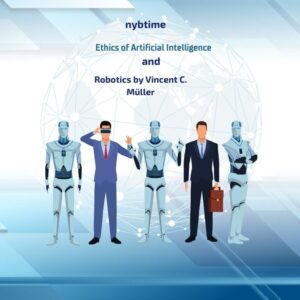
Of course here are some thorough summaries of academic works that investigate the relationship between spirituality and technology emphasizing why advances of technology might improve the world by taking spiritual and ethical issues into account.
1. Ethics of Artificial Intelligence and Robotics by Vincent C. Müller
Summary: An extensive summary of the moral concerns surrounding the creation and application of robotics and artificial intelligence (AI) is given in this article. It talks about how these technologies can affect jobs, privacy, and decision-making processes, among other possible social repercussions. Müller stresses that in order to make sure AI systems are in line with human ideals and advance the greater good it is crucial to incorporate ethical and religious frameworks into their design and implementation. The study argues that developers can produce technologies that are not only effective but also morally righteous and advantageous for society by incorporating ethical ideas from several philosophical and spiritual traditions.
2. The Role of Technology in Human Flourishing: A Multidisciplinary Approach by Michael Baur
Summary: In his paper, Michael Baur examines the ways in which technology might be used to advance human wellbeing, referencing a variety of academic fields such as philosophy ethics and religion. According to Builder developments in technology need to be assessed for their capacity to improve human fulfillment and much-being as well as for their apparent benefits. The study looks at different technology advancements and how they affect the well-being of individuals and society as a whole. It advocates for an integrative strategy that links technical advancement with the improvement of people’s quality life and offers an approach to assess technology through the prism of cultural and spiritual well-being.
3. Digital Mindfulness: Exploring the Impact of Technology on Spiritual Practices by Laura L. Nash
Summary: Laura L. Nash studies the impact of digital technology on traditional spiritual activities including meditation and mindfulness. The essay emphasizes how digital tools have both beneficial and detrimental effects on these habits. Technology on the one hand presents fresh possibilities for obtaining and disseminating spiritual content, possibly to a wider audience. However it can also result in diversions and lessen the intensity of spiritual activity. Nash talks on maximizing digital mindfulness techniques to preserve the core of conventional spiritual practices while taking advantage of contemporary technological advancements.
4. The Role of Technology in Promoting Social Good: Opportunities and Challenges by David G. Smith
Summary: In his paper David G. Smith explores the ways in which technology progress might be used for the benefit of society tackling issues like resource access inequality and environmental sustainability. The study examines a number of examples in which social justice and quality of life have been enhanced by the efficient use of technology. Smith contends that in order to make sure that technological developments have a positive impact on society they must be in line with moral and spiritual values. The significance of community involvement and policy-making in directing technology toward positive results is also covered in this study.
5. Spirituality in a Digital World: New Opportunities and Challenges by John W. Ellington
Summary: John W. Ellington explores how the digital age is transforming spiritual practice and experience. This article explores both the opportunities and challenges that digital technologies pose for spirituality. It examines how online platforms and digital tools are transforming religious and spiritual communities and how they offer new ways to connect and interact with spiritual content. At the same time Ellington also discusses potential downsides, such as the risk of superficial interactions and the loss of the traditional communal aspects of spirituality. The article suggests ways to balance digital interactions with deeper spiritual practice.
6. Integrating Spiritual Values with Technological Innovation by Sandra L. Schneider
Summary: The article by Sandra L. Schneider focuses on how to incorporate religion the process of technological innovation. It talks about how new technologies can be designed developed divine implemented with aspects in mind. Schneider contends that technological advancements that are in line with human values and welfare can also result from this integration. The paper presents case studies where such integration has produced favorable results and offers models and frameworks for incorporating all such principles into industrial practices.
7. Transhumanism and Spirituality: A Comparative Analysis by Mark Walker
Summary: In his paper Mark Walker compares and contrasts spirituality and transhumanism. The transhumanist movement which supports using technology to improve human capabilities frequently touches on spiritual issues pertaining to the nature of humanity and the future of consciousness. Walker investigates the relationship between transhumanist objectives and spiritual desires like the pursuit of immortality and the development of human potential. The study explores potential conflicts and convergences between spiritual perspectives and transhumanist ideals, providing insights into the mutual influence between these two domains.
Together these articles provide a wide perspective on the relationship between spirituality and technology emphasizing ethical issues the effects on spiritual practices and the ways in which technological advancements can improve the world by being in line with moral and spiritual principles.




